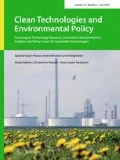Abstract
Renewable energy policies and adoption of new renewable energy technologies in different states of the USA are not uniform. The factors affecting the trends in adopting electrical energy generation using sustainable resources: wind, solar, hydro, geothermal and biomass as well as registered all electric vehicles in 50 states and district of Columbia in the USA was analyzed using multivariate linear regression analysis. Eight contributing factors: percentages of high school graduates; college graduates; total population; land area; percentage of water covered area; average annual income and registered democrats in the state were selected as predictor variables. Among eight factors considered, percentage of registered democrats was found as the most influencing factor (p = 0.00543) determining the renewable electrical energy adoption. The transition to all electric cars strongly co-related to higher average annual income of the population (p = 0.00141). In conclusion, an aggressive education campaign by environmentalist and pro-sustainability groups may help in de-coupling the energy and environment policies in the USA from political ideologies in order to achieve a more sustainable future.
Graphical abstract
Factors Affecting Sustainable Energy Technology Adoption Policies of 50 States and District of Columbia in the USA

Data availability
Enquiries about data availability should be directed to the authors.
References
Ahmed Z, Cary M, Shahbaz M, Vo XV (2021) Asymmetric nexus between economic policy uncertainty, renewable energy technology budgets, and environmental sustainability: evidence from the United States. J Clean Prod 313:127723
Ali S, Xu H, Ahmad N (2021) Reviewing the strategies for climate change and sustainability after the US defiance of the Paris Agreement: an AHP–GMCR-based conflict resolution approach Environment, Development and Sustainability, 1–32
Amarasekara AS (2013) Handbook of cellulosic ethanol. John Wiley & Sons, Hoboken
Aslan A, Destek MA, Okumus I (2018) Bootstrap rolling window estimation approach to analysis of the Environment Kuznets Curve hypothesis: evidence from the USA. Environ Sci Pollut Res 25:2402–2408
Ayling B, Unlocking the potential of low-temperature geothermal resources for direct-use applications in the USA. In: symposium on the application of geophysics to engineering and environmental problems 2021, 2021. Society of exploration geophysicists and environment and engineering …, pp 166–166
Ball PJ (2021) A review of geothermal technologies and their role in reducing greenhouse gas emissions in the USA. J Energy Res Technol 143:010903
Cho Y, Shaygan A, Daim TU (2019) Energy technology adoption: case of solar photovoltaic in the Pacific Northwest USA. Sustain Energy Technol Assess 34:187–199. https://doi.org/10.1016/j.seta.2019.05.011
Eshchanov B, Abdurazzakova D, Yuldashev O, Salahodjaev R, Ahrorov F, Komilov A, Eshchanov R (2021) Is there a link between cognitive abilities and renewable energy adoption: evidence from Uzbekistan using micro data. Renew Sustain Energy Rev 141:110819
IEA (2019) World energy investment 2019 report. International Energy Agency, Paris
IRENA I (2018) Renewable power generation costs in 2017 Report, International Renewable Energy Agency, Abu Dhabi
Karasmanaki E, Tsantopoulos G (2019) Exploring future scientists’ awareness about and attitudes towards renewable energy sources. Energy Policy 131:111–119. https://doi.org/10.1016/j.enpol.2019.04.032
Khan I, Hou F, Le HP (2021) The impact of natural resources, energy consumption, and population growth on environmental quality: Fresh evidence from the United States of America. Sci Total Environ 754:142222
Koondhar MA, Qiu L, Li H, Liu W, He G (2018) A nexus between air pollution, energy consumption and growth of economy: a comparative study between the USA and China-based on the ARDL bound testing approach. Agric Econ 64:265–276
Markard J, Bento N, Kittner N, Nunez-Jimenez A (2020) Destined for decline? Examining nuclear energy from a technological innovation systems perspective. Energy Res Soc Sci 67:101512
Marlow T, Miller S, Roberts JT (2021) Bots and online climate discourses: Twitter discourse on President Trump’s announcement of US withdrawal from the Paris Agreement Climate Policy: 1–13
Mayer A (2018) The fiscal impacts of energy: perspectives from local governments in the Mountain West USA. Energy Policy 122:186–193
Mazmanian DA, Jurewitz JL, Nelson HT (2020) State leadership in US Climate change and energy policy: the California experience. J Environ Dev 29:51–74
Moore RA, Martinetti D, Bigg EK, Christner BC, Morris CE (2021) Climatic and landscape changes as drivers of environmental feedback that influence rainfall frequency in the United States. Glob Change Biol 27:6381–6393
Pitt D, Michaud G, Duggan A (2018) Analyzing the costs and benefits of distributed solar energy in Virginia (USA): a case study of collaborative energy planning. J Environ Plan Manag 61:2032–2049
Pol MV, Ford KH (2020) Offshore wind energy and the fishing industry in the Northeastern USA. Modern fisheries engineering. CRC Press, Boca Raton, pp 115–124
Saint Akadiri S, Alola AA, Alola UV, Nwambe CS (2020) The role of ecological footprint and the changes in degree days on environmental sustainability in the USA. Environ Sci Pollut Res 27:24929–24938
Salahodjaev R (2016) Does intelligence improve environmental sustainability? An empirical test. Sustain Dev 24:32–40
Shamosh NA, Gray JR (2008) Delay discounting and intelligence: a meta-analysis. Intelligence 36:289–305
States101 (2022) Populations in US States. http://www.states101.com/populations
Statista (2022) Statista. https://www.statista.com/statistics/184260/educational-attainment-in-the-us/
Acknowledgements
We thank United States National Science Foundation Grant: NSF DMS -1950677, REU Site: Mathematical Modeling in the Sciences, for financial support.
Author information
Authors and Affiliations
Contributions
SR contributed to data collection; literature review; methodology; and analysis using R, TR contributed to data collection and analysis using R, AS.A contributed to conceptualization; writing, and editing.
Corresponding author
Ethics declarations
Conflict of interest
Authors declare that they have no known competing financial interests or personnel relationships that could have appeared to influence the work reported in this paper.
Additional information
Publisher's Note
Springer Nature remains neutral with regard to jurisdictional claims in published maps and institutional affiliations.
Rights and permissions
About this article
Cite this article
Roberts, S., Roland, T. & Amarasekara, A.S. Factors affecting renewable energy technology adoption policies of 50 states and district of Columbia in the USA. Clean Techn Environ Policy 25, 211–219 (2023). https://doi.org/10.1007/s10098-022-02404-z
Received:
Accepted:
Published:
Issue Date:
DOI: https://doi.org/10.1007/s10098-022-02404-z

